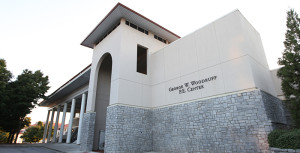Wearing long biker shorts and a sport shirt going down to her belly button, Sophie Gern (24C) entered the Woodruff Physical Education Center (WoodPEC) in the beginning of September for her first workout of the year. But WoodPEC staff reprimanded Gern for her outfit because of the small gap between her shorts and shirt.
“I asked the woman at the front desk where I could enter [the gym], and she immediately made a comment about what I was wearing along the lines of ‘you need to wear more clothes than that to work out because of COVID we don’t like people’s flesh out,’” Gern said of her experience walking into the WoodPEC.
The center’s dress code policy has caused frustration for several female students like Gern. Several women have reported being repeatedly dress coded by gym Community Compact Coordinators for having exposed midriffs, with some being explicitly told that their clothing is violating current COVID-19 rules.

Woodruff PE Center | Photo by Jason Oh
However, the Recreation and Wellness Policies website did not attribute this policy to COVID-19.
“Appropriate clothing and shoes must be worn at all times,” the site stated as of Aug. 31. “Shirts should cover the entire torso (back, chest, and midriff). Clothing with tears, holes, zippers, buttons, and rivets are not allowed on machines with upholstery.”
WoodPEC Director of Fitness and Wellness April Flint elaborated on this policy, noting that shirts have been required in fitness area for several years.
“The policy is not related to COVID-19,” Flint wrote in an email to the Wheel. “The purpose of the policy has always been to protect and prolong the life of upholstered strength equipment as well as reduce chances of the spread of bacterial infections, such as MRSA which can spread easily in spaces where equipment is shared and surfaces come into direct skin contact.”
This countered the experience of many female students, who were told by WoodPEC faculty that their exposed midriff, whether that be their entire torso or just one inch of skin, put the student body at risk for COVID-19 transmission.
“She made a comment about my midriff, saying ‘We don’t like midriffs out because of its flesh,’” Gern explained. “But also my whole arm was out and my legs, so I don’t know what the issue with the midriff specifically was.”
However, the gym’s policy to dress code students is not isolated to this year. Victoria Amorim (24C) was wearing a sports bra and high waisted leggings when she went to the WoodPEC on Oct. 19, 2020. While she worked out, she said that a few WoodPEC employees had gathered and looked at her.
“I was confused because I was following all the rules and wearing a mask,” Amorim said. “After a while of judgemental glances, one of the women workers approached me and said my outfit was not appropriate. I did not have another shirt, so I finished my workout in my velvet jacket.”
Much like Gern, Amorim was shocked by this interaction, saying that the gendered nature of the comment particularly surprised her.
“I was very upset by this incident, especially because boys often use the facility shirtless, especially when playing basketball,” Amorim said. “If it was a man wearing revealing clothing, there would be no issues, but because I am a woman, showing one third of my belly comes off as offensive and inappropriate.”
Moved by the incident, Amorim reached out to the Office of Dicrimination and Inclusivity and met with a representative from the office. However, the representative directed Amorim to the WoodPEC’s website and told her to follow the rules written there.
“It was a very frustrating response to receive,” Amorim said.
The WoodPEC’s dress code has since impacted the way women use and feel about the gym. After getting dress-coded, Gern said, “I felt violated, and so I walked out.” Amorim shared similar sentiments, indicating that the incident made her “very uncomfortable” and prompted her to stop using the facility.
“I was minding my own business working on my own health,” Amorim said. “I was really surprised to experience this kind of sexism at Emory by people who work here. If any sort of dress code is implemented, it should at least apply to everyone and not solely girls.”
Flint told the Wheel in an emailed statement that the policy was not meant to harm students and directed students to University resources if they felt they were treated unfairly.
“I’m sorry if anyone has experienced this. That’s not the intent of the policy,” Flint wrote. “If anyone feels that they have been discriminated against, they should reach out to our area supervisors directly, me personally or the Emory Ombuds Office.”
Sophie Gern is a contributing writer for the Wheel.






